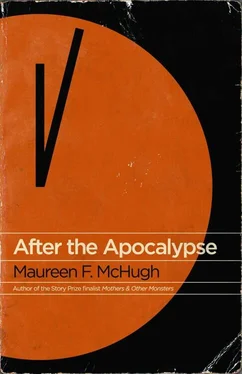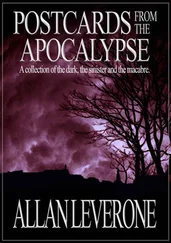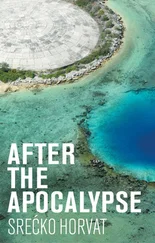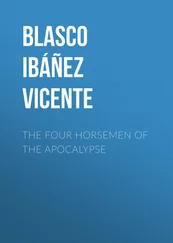“Goddamn, it’s hot,” Sherie says as I climb into the little yellow Toyota truck. “How’s your water?”
“Getting low,” I say. Sherie and Ed have a well.
“I’m worried we might go dry this year,” Sherie says. “They keep whining about the aquifer. If we have to buy water, I don’t know what we’ll do.”
Sherie is physically Chinese, one of the thousands of girls adopted out of China in the nineties and at the turn of the century. She said she went through a phase of trying to learn all things Chinese, but she complains that as far as she can tell, the only thing Chinese about her is that she’s lactose intolerant.
“I had a migrant at my door this morning,” I say.
“Did you feed him?” she asks. She leans into the shift, trying to find the gear, urging the truck into first.
“He weeded my garden,” I say.
“They’re not going to stop as long as you feed them.”
“Like stray cats,” I say.
Albuquerque has never been a pretty town. When I came, it was mostly strip malls and big-box stores and suburbs. Ten years of averages of four inches of rain or less have hurt it badly, especially with the loss of the San Juan/Chama water rights. Water is expensive in Albuquerque. Too expensive for Intel, which pulled out. Intel was just a larger blow in a series of blows.
The suburbs are full of walkaway houses—places where homeowners couldn’t meet the mortgage payments and just left, the lots now full of trash and windows gone. People who could went north for water. People who couldn’t did what people always do when an economy goes soft and rotten: they slid, to rented houses, rented apartments, living in their cars, living with their families, living on the street.
But inside Sherie’s parents’ home it’s still twenty years ago. The countertops are granite. The big-screen plasma TV gets hundreds of channels. The freezer is full of meat and frozen Lean Cuisine. The air conditioner keeps the temperature at a heavenly seventy-five degrees. Sherie’s mother, Brenda, is slim, with beautifully styled graying hair. She’s a psychologist with a small practice.
Brenda has one of my dolls, which she bought because she likes me. It’s always out when I come, but it doesn’t fit Brenda’s tailored, airily comfortable style. I have never heard Brenda say a thing against Ed. But I can only assume that she and Kyle wish Sherie had married someone who worked at Los Alamos or at Sandia or the university, someone with government benefits like health insurance. On the other hand, Sherie was a wild child who, as Brenda said, “did a stint as a lesbian,” as if being a lesbian were like signing up for the Peace Corps. You can’t make your child fall in love with the right kind of person. I wish I could have fallen in love with someone from Los Alamos. More than that, I wish I had been able to get a job at Los Alamos or the university. Me, and half of Albuquerque.
Sherie comes home, her hair rough-cut in her kitchen with a mirror. She is loud and comfortable. Her belly is just a gentle insistent curve under her blue Rumatel goat dewormer T-shirt. Brenda hangs on her every word, knows about the trials and tribulations of raising goats, asks about Ed and the truck. She feeds us lunch.
I thought this life of thoughtful liberalism was my birthright, too. Before I understood that my generation was to be born in interesting times.
At the obstetrician’s office, I sit in the waiting room and try not to fall asleep. I’m stuffed on Brenda’s chicken-and-cheese sandwich and corn chowder. People magazine has an article about Tom Cruise getting telomerase regeneration therapy, which will extend his lifespan an additional forty years. There’s an article on some music guy’s house talking about the new opulence: cutting-edge technology that darkens the windows at the touch of a hand and walls that change color, rooms that sense whether you’re warm or cold and change their temperature, and his love of ancient Turkish and Russian antiques. There’s an article on a woman who has dedicated her life to helping people in Siberia who have AIDS.
Sherie comes out of the doctor’s office on her cellphone. The doctor tells her that if she had insurance, they’d do a routine ultrasound. I can hear half the conversation as she discusses it with her mother. “This little guy,” Sherie says, hand on her belly, “is half good Chinese peasant stock. He’s doing fine.” They decide to wait for another month.
Sherie is convinced that it’s a boy. Ed is convinced it’s a girl. He sings David Bowie’s “China Girl” to Sherie’s stomach, which for some reason irritates the hell out of her.
We stop on our way out of town and stock up on rice and beans, flour, sugar, coffee. We can get all this in Belen, but it’s cheaper at Sam’s Club. Sherie has a membership. I pay half the membership, and she uses the card to buy all our groceries, then I pay her back when we get to the car. The cashiers surely know that we’re sharing a membership, but they don’t care.
It’s a long, hot drive back home. The air conditioning doesn’t work in the truck. I am so grateful to see the trees that mark the valley.
My front door is standing open.
“Who’s here?” Sherie says.
Abby is standing in the front yard, and she has clearly recognized Sherie’s truck. She’s barking her fool head off and wagging her tail, desperate. She runs to the truck. I get out and head for the front door, and she runs toward the door and then back toward me and then toward the door, unwilling to go in until I get there, then lunging through the door ahead of me.
“Hudson?” I call the other dog, but I know if the door is open, he’s out roaming. Lost. My things are strewn everywhere, couch cushions on the floor, my kitchen drawers emptied on the floor, the back door open. I go through to the back, calling the missing dog, hoping against hope he is in the back yard. The back gate is open, too.
Behind me I hear Sherie calling, “Don’t go in there by yourself!”
“My dog is gone,” I say.
“Hudson?” she says.
I go out the back and call for him. There’s no sign of him. He’s a great boy, but some dogs, like Abby, tend to stay close to home. Hudson isn’t one of those dogs.
Sherie and I walk through the house. No one is there. I go out to my workshop. My toolbox is gone, but evidently whoever did this didn’t see the computer closed and sitting on the shelf just above eye level.
It had to be the guy I gave soup to. He probably went nearby to wait out the heat of the day and saw me leave.
I close and lock the gate, and the workshop. Close and lock my back door. Abby clings to me. Dogs don’t like things to be different.
“We’ll look for him,” Sherie says. Abby and I climb into the truck, and for an hour we drive back roads, looking and calling, but there’s no sign of him. Her husband, Ed, calls us. He’s called the county and there’s a deputy at my place waiting to take a statement. We walk through the house, and I identify what’s gone. As best I can tell, it isn’t much. Just the tools, mainly. The sheriff says they are usually looking for money, guns, jewelry. I had all my cards and my cell phone with me, and all my jewelry is inexpensive stuff. I don’t have a gun.
I tell the deputy about the migrant this morning. He says it could have been him, or someone else. I get the feeling we’ll never know. He promises to put out the word about the dog.
It is getting dark when they all leave, and I put the couch cushions on the couch. I pick up silverware off the floor and run hot water in the sink to wash it all. Abby stands at the back door, whining, but doesn’t want to go out alone.
It occurs to me suddenly that the doll I was working on is missing. He stole the doll. Why? He’s not going to be able to sell it. To send it home, I guess, to the baby in the photo. Or maybe to his wife, who has a real baby and is undoubtedly feeling a lot less sentimental about infants than most of my customers do. It’s a couple of weeks of work, not full time, but painting, waiting for the paint to cure, painting again.
Читать дальше












